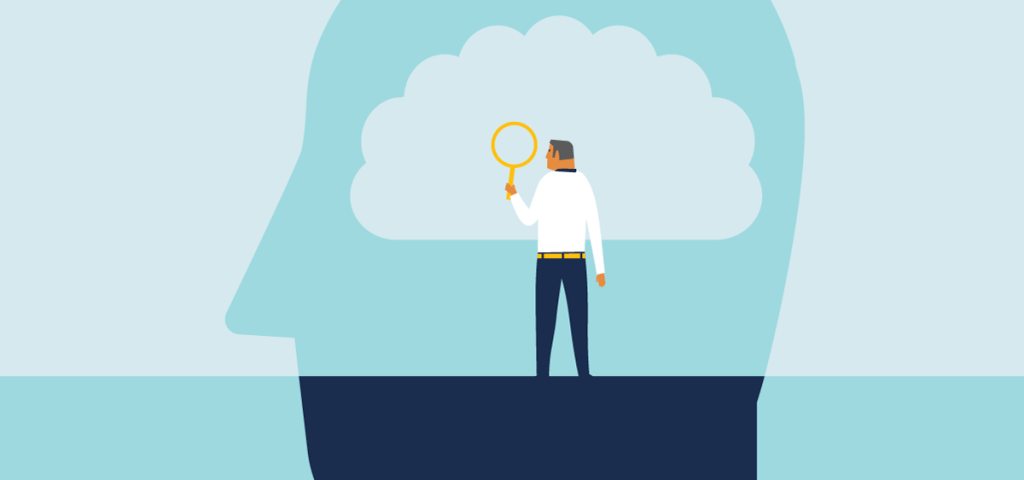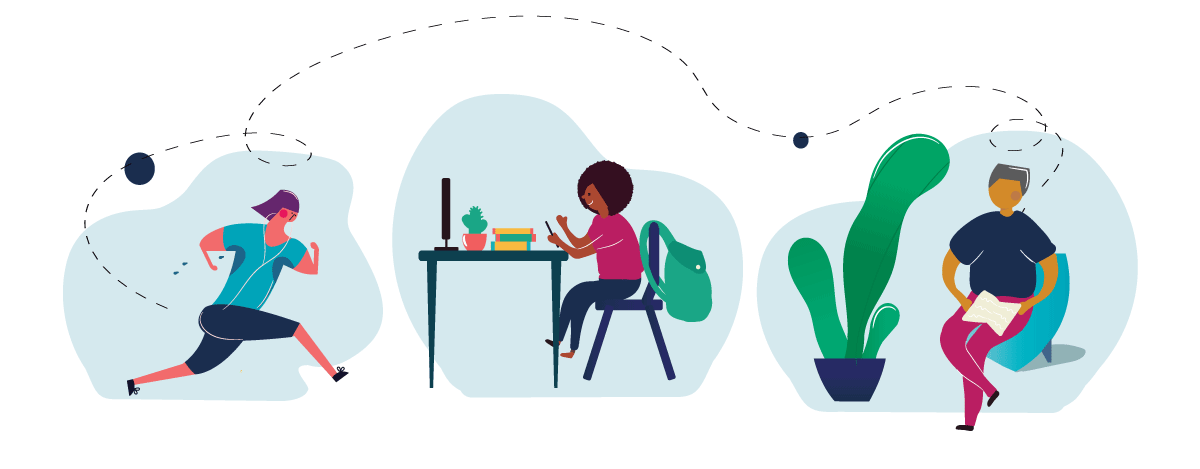How Counseling Can Help After a Concussion

A lacrosse player takes a blow to the head from an opponent’s stick but remains conscious and keeps playing. A parent hits their head on a cabinet door while making school lunches but has no time to slow down. An elderly person becomes dizzy and falls, landing on their knees, but the force involved jostles their brain.
They may seem minor, but each of these injuries could lead to a concussion. Without treatment, a concussion can have lasting effects on a person’s mental, physical, and emotional health.
A mental health counselor can support someone in the aftermath of a concussion and guide people in their support networks—family, friends, coaches, teachers, and employers—helping them better understand what a concussion is and how they can be of assistance.
What Is a Concussion?
A concussion is a kind of traumatic brain injury that can happen when an individual receives a blow, bump, or jolt to the head, according to the Centers for Disease Control and Prevention (CDC). A concussion can also happen when a blow to the body shakes the head back and forth, damaging the brain.
The injury, whether to the head or body, does not have to look serious to be serious. Even mild bumps can cause severe damage.
Dr. Michele Kerulis, a professor of counseling with Counseling@Northwestern, compared the brain with a concussion to appliances in a power surge.
“If your cell phone is plugged in and there’s a power surge, it could jolt your phone, reset it, and make it a little bit funky,” Dr. Kerulis said.
Similarly, concussions change the way the brain functions. The physical, short-term effects are clear and commonly understood: headaches, nausea, vomiting, and dizziness, among other symptoms.
Less commonly acknowledged are the emotional and psychological effects—including anxiety, depression, and loneliness—and the fact that, for some patients, symptoms last a long time.
What Are the Signs and Symptoms of a Concussion?
Someone who has sustained a concussion might start acting in an out-of-the-ordinary way in the immediate aftermath of the injury.
Others may notice that the injured person does any of the following:
- Can’t remember what happened before or after the blow
- Seems disoriented or confused
- Forgets where they are and what they are doing
- Becomes slow to answer questions
- Loses consciousness
Symptoms may be short- or long-term and differ by individual and the severity of the concussion. The CDC groups concussion symptoms into four categories: thinking/remembering, physical, sleep, and emotional/mood.
Thinking/Remembering
- Difficulty thinking clearly
- Feeling slowed down
- Trouble concentrating
- Struggling to recall new information
Sleep
- Sleeping more than usual
- Sleeping less usual
- Struggling to fall asleep
Physical
- Headaches or “pressure” in the head
- Fuzzy or blurred vision
- Nausea or vomiting
- Fatigue or dizziness
- Sensitivity to noise or light
- Balance problems
- Fatigue
- Feeling sluggish, foggy, or groggy
Emotional/Mood
- Irritability
- Sadness
- Higher emotionality
- Anxiety
- Nervousness
- Just not feeling right
What Are the Psychological and Emotional Effects of a Concussion?
According to the Mayo Clinic, symptoms of a concussion can show up immediately or be delayed, and there is no set period of time for how long symptoms can last.
For some people, the psychological and emotional effects of a traumatic brain injury (TBI) can linger for a year or more. Symptoms could include any of the following:
- Mood swings
- Emotional outbursts (crying, laughing)
- Depression
- Sadness
- Irritability
- Anxiety
- Loneliness
Counselors call this condition post-concussion syndrome, in which symptoms last for three months or more.
The risk of post-concussion syndrome is not associated with the severity of the initial injury. The individual does not require a previous history of mental health concerns to be at risk for these long-lasting symptoms, Dr. Kerulis said.

How Can Counselors Help After a Concussion?
Because a concussion affects the way an individual interacts with the world, recovery takes time and can involve making changes in daily routine and asking for support from one’s community.
A mental health counselor can be an important resource during concussion recovery. As an expert in the field of sport and exercise psychology, Dr. Kerulis shared a number of ways in which counselors can offer support.
Developing a treatment plan.
Anyone who sustains a head injury should be thoroughly examined by a multidisciplinary medical team—which may include a physician, nurse practitioner, and athletic trainer—that will examine a patient’s physical health.
The medical team should also include a mental health professional, like a licensed mental health counselor, who can develop a treatment plan in line with the individual’s mental health history. A mental health professional can administer a neuropsychological test to understand how the concussion has affected the person, including assessing bodily impact and signs of depression.
Sorting through feelings.
A licensed counselor can work with people to examine different feelings—such as anger, shame, guilt, or fear—related to an injury. As people name these feelings with their counselor, they can begin to understand their own reactions to the concussion and how it has affected their life. A signal that it’s a good time to talk with a counselor is when the person starts feeling like they should be “over it.”
Grieving.
A concussion can have long-term implications. A person’s life, including their career and relationships, may change in ways they don’t want or expect. Sometimes change is loss, and these losses are something to grieve.
A counselor can guide people through the grieving process and move toward emotional healing. They can help their clients understand what they expect of themselves—and how the concussion alters these expectations.
Often the response to an injury is to shake it off and move on. But the healthy choice is to examine the meaning behind the changes in your life so you can heal.
Learning how to ask for support.
Family, friends, and colleagues likely want to be an active part of a person’s recovery from a concussion, but they may not know how. The injured person may not know, either. A counselor can help a client to articulate their needs and emotional goals so that loved ones and employers can work with the person to achieve them.
Here are some proactive ways to ask for assistance:
- “I need you to help me navigate the grocery store.”
- “After this meeting, I need to take a cognitive break.”
- “Is there someone who can read my emails to me and write down the responses I dictate to them?”
Dr. Kerulis offers further advice in these Bustle articles: How to Talk to Your Friends About Your Mental Health and How to Talk to Your Parents About Your Mental Health.
Balancing hope and realism.
Part of emotionally recovering from a concussion is having a clear picture for what healing looks like. A licensed counselor can create hopeful yet realistic expectations. For instance, someone can learn to hope that the headaches will subside while acknowledging that headaches may be part of their daily experience for a while.
Healthy expectations can be freeing. Clients can move forward in their lives with a sense of optimism and gratitude for the progress they have made. They will also have tools to use if struggles resurface. A vision of healthy recovery can propel a person forward.
Understanding medical papers.
Healthcare involves a lot of paperwork, some of which can be difficult to understand for people without a medical background. A counselor can guide a client through forms and literature they may receive and translate any jargon they don’t understand.
Adjusting back to life.
Mental health counselors can help individuals integrate back into their daily routines and rhythms. Helping people move slowly into their routines can help them learn patience with the injury recovery process.
For athletes: A counselor will work with athletes, coaches, and athletic trainers to develop a graduated return-to-play plan. As a team, they will slowly get an athlete back to physical activity while continuously monitoring concussion symptoms, such as dizziness or memory loss. If symptoms increase, then activity has to decrease. A well-educated athletic staff can ease this process.
For students: A counselor will assist a student in slowly integrating back into the classroom. They can have conversations with educators to discuss why there may be a small delay in work. Together, they can develop a plan to keep the student up to date with the material without overexerting themselves.
For employees: A counselor will work with an individual to understand which day-to-day responsibilities they can handle during the transition back into work. They can educate employers and workplaces on what concussion recovery looks like and the potential side effects—so that colleagues can be a better support system.
Though concussions can have far-reaching effects on a person’s health, capable and caring counselors can help them adapt and return to a healthy, full life.
Resources on How to Deal With a Concussion
Information is available online from organizations and websites for supportive friends and family who want to learn how to help someone with a concussion and people who have experienced one.
- Brain Injury Association of America: national brain injury advocacy organization with provider and caregiver webinars, a database of virtual support groups, and educational content, including a concussion information series.
- Brainline: national multimedia project providing authoritative information and support to anyone whose life has been affected by brain injury or PTSD—patients, their family and friends, and their healthcare professionals.
- Centers for Disease Control and Prevention Injury Center, Heads Up: campaign and hub of information aimed at supporting children and teens, with information on returning to school and sports after a concussion.
- Concussion Alliance: education and advocacy nonprofit that aims to address the needs of concussion patients and educate providers on current research and recommendations.
- Concussion Legacy Foundation: organization supporting patients, caregivers, advocates, and others affected by concussions and chronic traumatic encephalopathy (CTE), a degenerative brain disease resulting from repeated brain trauma.
- Headway Foundation: group founded by athletes seeking to promote a safer sports culture and provide resources for patients, including its Concussion Circle community that features weekly discussions, one-to-one peer support, and a meditation program.
- International Concussion Society: global organization in a mission to provide a central repository of accurate and scientifically vetted concussion research to medical professionals, athletes, administrators, coaches, patients, and the public; offers a page with facts on concussions.
- National Concussion Management Center: nonprofit with information on concussion management for individuals, families, educators, and healthcare providers.
- PINK Concussions: organization that focuses on medical care for women and girls with brain injuries, including concussion incurred from sport, violence, accidents, or military service; provides a list of support groups.
- United States Brain Injury Alliance: group advocating for those living with brain injuries by sharing patients’ stories; offers webinars for providers and peer-to-peer communication.
Citation for this content: Counseling@Northwestern, the online Master of Arts in Counseling Program from The Family Institute at Northwestern University.

